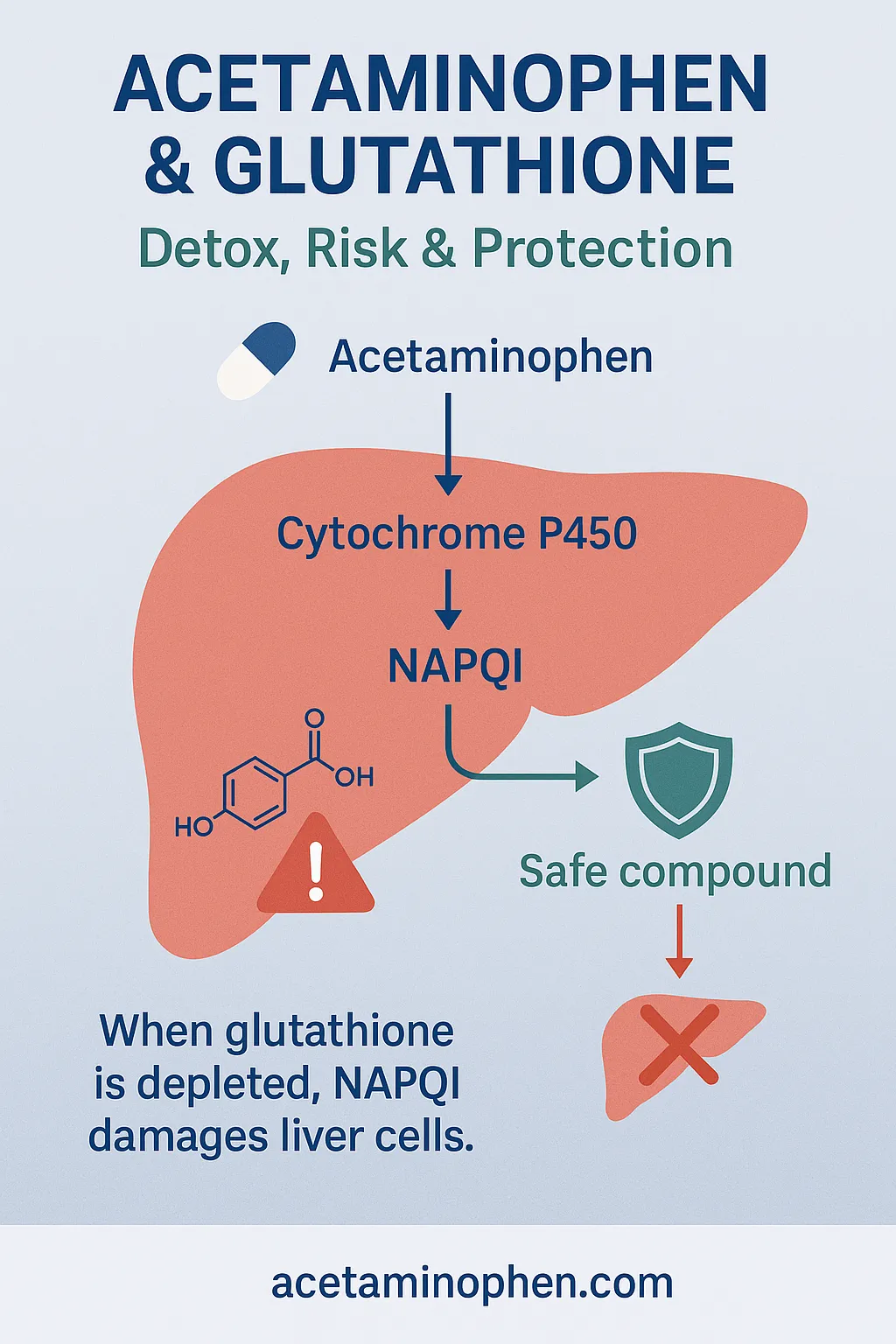
Leucovorin, Medications, Glutathione, and the Bigger Picture
Leucovorin, Medications, Glutathione, and the Bigger Picture
I wasn’t planning to post this, but after hearing from so many of you, I know it’s time to answer all the questions in one place. I LOVE YOU ALL!!!

This isn’t an easy topic, but it’s one worth shining light on. So, let’s walk through it together and start with how acetaminophen is processed in the body. So, let’s walk through it together, starting with how acetaminophen is processed in the body.
I’m glad the conversation around acetaminophen is getting more attention, because it really is worth looking at and talking about.
Acetaminophen is processed in the liver, where a small amount turns into a reactive compound called NAPQI. Normally, glutathione, the body’s master antioxidant, clears this out. Some people have lower reserves, or genetic variants that make detoxification less efficient, and that is why researchers are asking important questions.
Much of the research spotlight has been on Tylenol use during pregnancy, because this is such a sensitive window of development. Studies suggest an association between prenatal acetaminophen exposure and a higher risk of ADHD or autism. That does not mean Tylenol causes autism. What it really shows is that certain medications can place extra demand on detox and antioxidant pathways at a time when both mom and baby are already vulnerable.
And Tylenol is not the only one. Other medications sometimes recommended during pregnancy, such as antibiotics, SSRIs, antifungals, anticonvulsants, and even NSAIDs, can also deplete glutathione or disrupt methylation. This is why the conversation should not stop with one medication.
Leucovorin, also known as folinic acid, fits into this picture as well. It is an “active” form of folate that bypasses some of the bottlenecks in folate metabolism. These include MTHFR variants or folate receptor autoantibodies (FRAA). In autism research, it has been studied most for children with FRAA, because it helps folate actually reach the brain. Folate is not just about DNA synthesis. It is also central to methylation, which indirectly supports glutathione. If a child or fetus already has genetic variants or antibodies that impair folate transport, their ability to make glutathione may already be compromised. Add medications that further use up glutathione, and oxidative stress can rise quickly.
So, while Leucovorin does not directly fix glutathione depletion, it strengthens the other side of the equation by supporting folate, methylation, and antioxidant balance.
About 40 percent of people carry some form of MTHFR variant. This gene helps the body use folate, which is essential for DNA synthesis, red blood cell production, and neural tube development in pregnancy. When MTHFR function is reduced, folic acid, the synthetic form of B9 added to fortified foods and many prenatals, may not convert efficiently. For this reason, some individuals do better with methylfolate or folinic acid, which bypass those blocks. Folate status affects methylation, and methylation affects glutathione. When glutathione is low, the body has more difficulty handling toxins. This is why researchers are studying whether prenatal acetaminophen use is linked with neurodevelopmental outcomes. Current studies show associations, but not causation. Genetics and overall toxin load likely play a large role in who is most vulnerable.
Other genes also matter. MTHFR, MTR, MTRR, SHMT, and MAT1A are methylation cycle genes that feed into glutathione production. COMT influences how methyl groups are spent. GST uses glutathione to neutralize toxins, and certain variants reduce efficiency. SOD2 handles oxidative stress, and when it is impaired, glutathione demand goes up. Put together, a child with FRAA, weak methylation genes, and GST or SOD variants may already be on low reserves. Add acetaminophen, ibuprofen, or other glutathione-draining medications, and those reserves can drop even faster.
Of course, medications aren’t the only things that affect these systems. Environmental exposures such as pesticides, mold toxins, and air pollution place added strain. Nutrient deficiencies, especially low folate, B12, and antioxidants, can weaken the system. Maternal health factors like infections, inflammation, and stress add another layer. Everyday chemicals, from plastics to flame retardants to heavy metals, also create extra demand on methylation, glutathione, and mitochondrial function.
This is part of why neurodivergence often runs in families. Genetics play a big role, and siblings may share variants that make them more sensitive to the same exposures. Families also share environments, including diet, air, and stress. That is why multiple children in a family might all show ADHD, autism, or related traits.
As a mom, I’ve had those moments of looking back and wondering if something I did, or didn’t do, made a difference. The truth is, moms do not purposely make choices that would harm their child. We were following the guidance available at the time and doing the very best we could with the knowledge we had. There should be no guilt, only grace.
The real takeaway is awareness. When we understand our genetics and potential vulnerabilities, we have a clearer roadmap. With that knowledge, families can take steps to reduce risks, support detox pathways, and make more informed choices moving forward. This isn’t about blame. It’s about compassion and empowerment for ourselves, our children, and future generations.
Leucovorin helps by bypassing folate blocks, supporting methylation, and indirectly boosting glutathione. Medications and environmental factors can impact detox pathways, especially when glutathione is already low. Genetics set the stage, while environment and exposures influence the outcome. Autism, ADHD, and other neurodevelopmental conditions are complex. There is no single cause. Shining light on many contributing factors helps families and providers make informed choices, without blame and without shame.
If you’d like to have a conversation, reach out. I’d love to chat. [email protected] or text 865-333-4554
